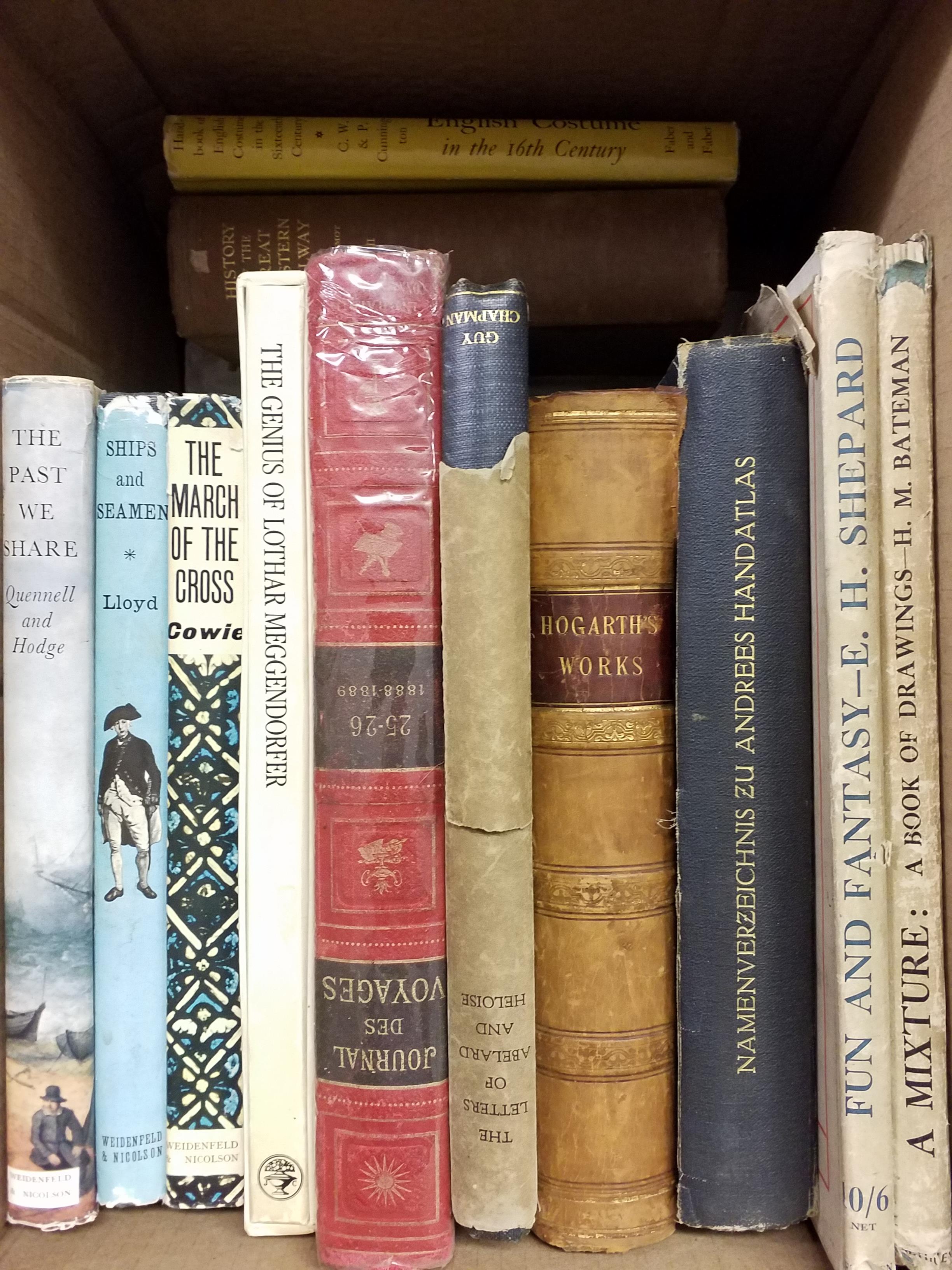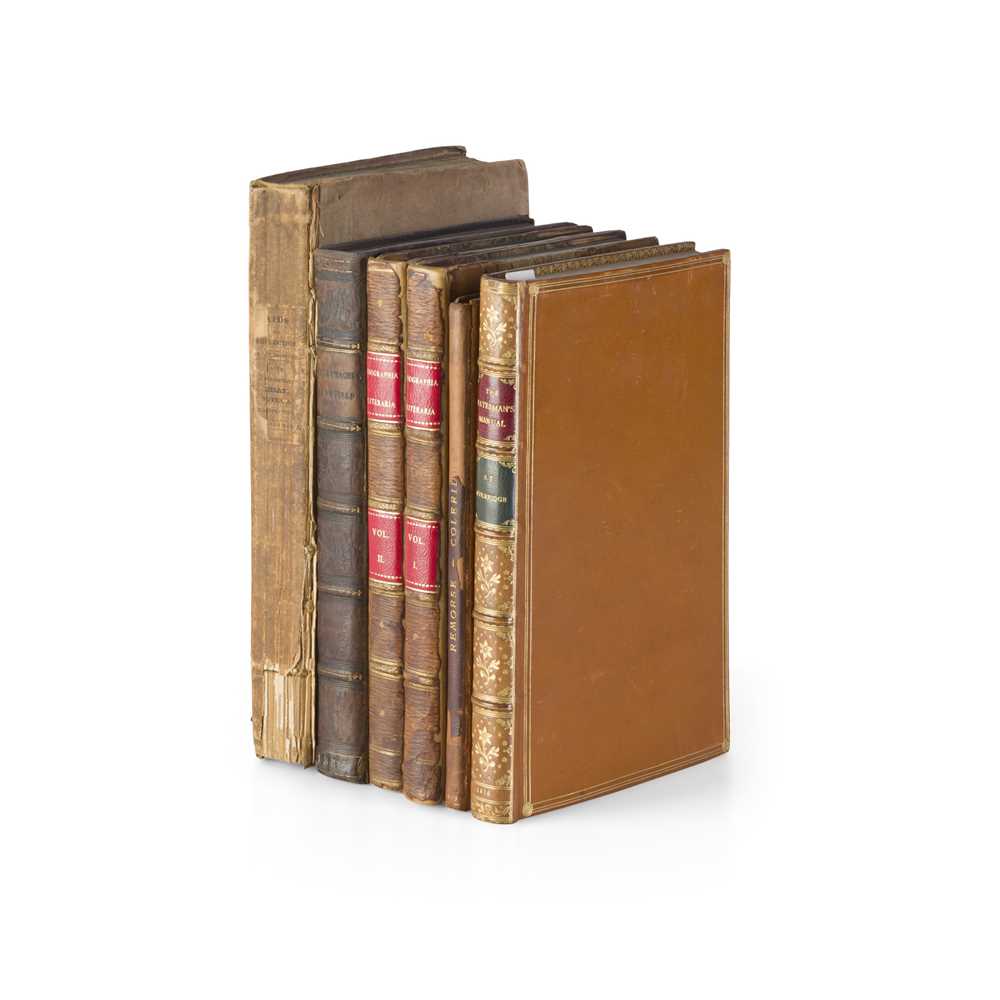COLERIDGE, Samuel Taylor (1772-1834). Aids to Reflection in the formation of a Manly Character . London: Taylor and Hessey, 1825. 8° (196 x 111mm). (Without advertisement leaves at end.) Uncut in later 19th-century speckled calf gilt by [?]Bedford, preserving earlier yellow glazed front wrapper, top edges gilt, others uncut, gilt turn-ins (upper cover detached). Provenance : presentation copy from the author to Robert Southey (title inscribed at foot: 'Robert Southey from S.T.C./London 6 June 1825'; with corrections, additions and deletions in Coleridge's hand on 6 pages and 2-page note in his hand on rear endpaper) -- Sir George Grove (signature on yellow wrapper) -- [George Prichard, Chester (bookseller's blindstamp on wrapper)] -- purchased from Rosenbach, Philadelphia, 30 January 1946, $585. FIRST EDITION, PRESENTATION COPY TO SOUTHEY with inscription dated only days after the book's publication in late May. The annotations to this copy were evidently made for personal reasons rather than because Southey intended to review the book. Southey, who began a long association with John Murray's Quartely Review in 1809, told John Lockhart the newly-appointed editor, that he 'understood that Heraud had written a paper upon the Aids to Reflection by S.T.C. which was very ably written -- but over laboured and too much like the book itself.' As Coleridge had anticipated, no notice of his book appeared in the Quarterly , although J.A. Heraud published a favourable review of the second edition (1831) in Fraser's Magazine (see Rosemary Ashton Life of Samuel Taylor Coleridge , 1996, p. 364). Five of Coleridge's manuscript alterations in this presentation copy follow the printed errata (pp. 2, 13, 15 -- only partially, 21 and 191). On p. 194 the 2nd sentence is deleted (as in lot 92, but lot 92 is without the appended 4-word note). More important is the 9-line note added on pp. 232-233. This concerns belief in the existence of a 'one only God' and 'the Belief of a Future State in connection with and dependence on the belief of God as a moral judge,' as opposed to 'the mere assurance of a Soul that survives the Body,' the latter being a 'faith of nature,' but not 'a Religion of Nature -- or rather, it is not Religion at all'). On p. 306 a note to lines 5-6 refers the reader to 'the Ms note on the blank leaf at end of the volume'; pp. 344-345 have 3 small deletions, and 7 words added. The 60-line manuscript note on 2 blank pages at the end of the volume, is divided into two paragraphs, and forms a 'note on lines 5-6 of p. 306' which refer to 'the guilty Past in its swift flight.' Coleridge explains that 'This and one or two other similar passages were written for the purpose of accustoming the young student to St. Paul's style of Thought and expression.' He stresses that 'it is not the criminal Deed (= Factum ) but the sinful Act (= Facinus ) that wounds the conscience. But the Act is inseparable from its spiritual source ... It is one with the sinful Will, one therefore with the Agent, the Man himself ....' As a result of 'the tricks and devices of self-delusion, the Act (=the Agent thus abstracted) would fain case itself in the Deed: and under this impulse it usurps the name and transfers to itself the predicate or proper character of the Deed ... In the language of the Day ... the Sinner cheats himself by transferring his attention from the corrupt State of the Moral Being to some one or more contingent result, product or symptom of that state.' [Second paragraph:] It is 'remorse' which 'detects and unmasks this imposture: compelling the Act (i.e. the Sinner considered abstractly in relation to the Sin) to feel and confess its continuing and abiding presentness ... Remorse is no Purgatory Angel. It is a sight that burns ....' This copy is no. 2 ('present location unknown') of 13 annotated copies of Aids to Reflection (1825) listed in Collected Works , IX, ed. John Beer (1993), pp. 479-83, being last recorded in a Rosenbach catalogue
COLERIDGE, Samuel Taylor (1772-1834). Aids to Reflection in the formation of a Manly Character . London: Taylor and Hessey, 1825. 8° (196 x 111mm). (Without advertisement leaves at end.) Uncut in later 19th-century speckled calf gilt by [?]Bedford, preserving earlier yellow glazed front wrapper, top edges gilt, others uncut, gilt turn-ins (upper cover detached). Provenance : presentation copy from the author to Robert Southey (title inscribed at foot: 'Robert Southey from S.T.C./London 6 June 1825'; with corrections, additions and deletions in Coleridge's hand on 6 pages and 2-page note in his hand on rear endpaper) -- Sir George Grove (signature on yellow wrapper) -- [George Prichard, Chester (bookseller's blindstamp on wrapper)] -- purchased from Rosenbach, Philadelphia, 30 January 1946, $585. FIRST EDITION, PRESENTATION COPY TO SOUTHEY with inscription dated only days after the book's publication in late May. The annotations to this copy were evidently made for personal reasons rather than because Southey intended to review the book. Southey, who began a long association with John Murray's Quartely Review in 1809, told John Lockhart the newly-appointed editor, that he 'understood that Heraud had written a paper upon the Aids to Reflection by S.T.C. which was very ably written -- but over laboured and too much like the book itself.' As Coleridge had anticipated, no notice of his book appeared in the Quarterly , although J.A. Heraud published a favourable review of the second edition (1831) in Fraser's Magazine (see Rosemary Ashton Life of Samuel Taylor Coleridge , 1996, p. 364). Five of Coleridge's manuscript alterations in this presentation copy follow the printed errata (pp. 2, 13, 15 -- only partially, 21 and 191). On p. 194 the 2nd sentence is deleted (as in lot 92, but lot 92 is without the appended 4-word note). More important is the 9-line note added on pp. 232-233. This concerns belief in the existence of a 'one only God' and 'the Belief of a Future State in connection with and dependence on the belief of God as a moral judge,' as opposed to 'the mere assurance of a Soul that survives the Body,' the latter being a 'faith of nature,' but not 'a Religion of Nature -- or rather, it is not Religion at all'). On p. 306 a note to lines 5-6 refers the reader to 'the Ms note on the blank leaf at end of the volume'; pp. 344-345 have 3 small deletions, and 7 words added. The 60-line manuscript note on 2 blank pages at the end of the volume, is divided into two paragraphs, and forms a 'note on lines 5-6 of p. 306' which refer to 'the guilty Past in its swift flight.' Coleridge explains that 'This and one or two other similar passages were written for the purpose of accustoming the young student to St. Paul's style of Thought and expression.' He stresses that 'it is not the criminal Deed (= Factum ) but the sinful Act (= Facinus ) that wounds the conscience. But the Act is inseparable from its spiritual source ... It is one with the sinful Will, one therefore with the Agent, the Man himself ....' As a result of 'the tricks and devices of self-delusion, the Act (=the Agent thus abstracted) would fain case itself in the Deed: and under this impulse it usurps the name and transfers to itself the predicate or proper character of the Deed ... In the language of the Day ... the Sinner cheats himself by transferring his attention from the corrupt State of the Moral Being to some one or more contingent result, product or symptom of that state.' [Second paragraph:] It is 'remorse' which 'detects and unmasks this imposture: compelling the Act (i.e. the Sinner considered abstractly in relation to the Sin) to feel and confess its continuing and abiding presentness ... Remorse is no Purgatory Angel. It is a sight that burns ....' This copy is no. 2 ('present location unknown') of 13 annotated copies of Aids to Reflection (1825) listed in Collected Works , IX, ed. John Beer (1993), pp. 479-83, being last recorded in a Rosenbach catalogue
.jpg)
.jpg)






.jpg)
.jpg)





Testen Sie LotSearch und seine Premium-Features 7 Tage - ohne Kosten!
Lassen Sie sich automatisch über neue Objekte in kommenden Auktionen benachrichtigen.
Suchauftrag anlegen